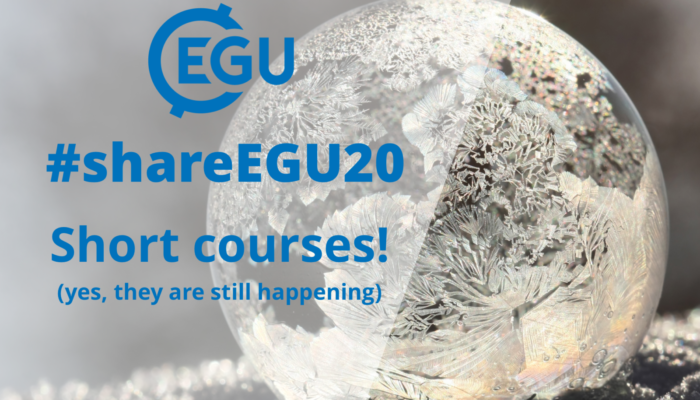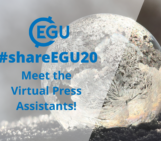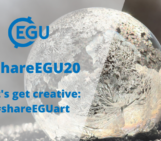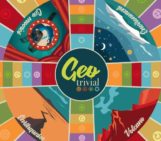
You might now be wondering what is happening with the short courses this year as move the physical General Assembly to our temporary home online with #shareEGU20. Well with over 90 short course proposals this year we could not keep them all – no matter how much we wanted to, so the Programme Committee and Early Careers Science Union Representative, with help from the EGU Communications and Policy team selected six of the best general short courses, that we thought we could run online instead and asked the organisers of these short courses if they woould be willing to work with us to try something a littel different – and they said yes!
Before we show you the list of short courses and when they will be available, you might be asking:
How do you participate in a #shareEGU20 short course?
The main way will be via our YouTube channel. Every day at 12.30 CEST from Monday 4 May to Friday 8 May we will be releasing a pre-recorded short course, webinar style, to the EGU YouTube channel. The course leaders will be available to answer questions in the comments section for an hour after the videos are released (between 12.30 and 13.45 CEST), so you can interact with them about the video, live, as you are watching it.
Afterwards the videos will remain online, so you can watch them at your convenience. The links on this page will be added as the videos go online throughout the week.
On Monday 4 May, there is also a special interactive short course about writing science poetry that will not be released as a pre-recorded video, but will instead be recorded live and uploaded to our YouTube channel later. If you want to take part in this interactive Zoom based short course, places are limited, so make sure that you register using the link here.
Monday 4 May, 12:30 CEST – YouTube
SC3.1 – Open and FAIR Your Science.
For research to have the broadest possible impact and be of high community-supported caliber, it should be open and FAIR – Findable, Accessible, Interoperable, and Reusable. Methods to support open-access research output and tools are growing in popularity and are becoming increasingly easy to use. There is no time like the present to join the movement and this short course aims to introduce researchers to open and FAIR principles and methods, such as open access publishing, sharing data, code, and models, publishing negative/unexpected results, and efforts to increase reproducibility. FAIR science allows scientists, decision-makers, and the broader public to better access science and engineering research output and better understand its broader impacts. In this Short Course, invited experts will introduce and demonstrate the general concepts of open and FAIR methods and technologies and their benefits for the researcher. The general introduction will be followed by an interactive discussion on FAIRness in geoscience, the exchange of experiences, and an outlook to the future of research. Finally, we will give several examples of how you can make your science open and FAIR.
Conveners Caitlyn Hall, Niels Drost, Lieke Melsen, Tim van Emmerik.
Pre-recorded webinar – watch this space…
Monday 4 May, 16:15 CEST– Zoom
Poetry is one of the oldest forms of art, potentially even predating literacy. However, what on Earth does it have to do with science? One is usually subjective and emotive, whilst the other (for the most part) is objective and empirical. However, poetry can be a very effective tool in communicating science to a broader audience, and can even help to enhance the long-term retention of scientific content. During this session, we will discuss how poetry can be used to make (your) science more accessible to the world, including to your students, your professors, your (grand)parents, and the general public.
Writing a poem is not a particularly difficult task, but writing a good poem requires both dedication and technique; anyone can write poetry, but it takes practice and process to make it effective. In this session, experienced science-poets will discuss the basics of poetry, before encouraging all participants to grab a pen and start writing themselves. We aim to maximise empowerment and minimise intimidation. Participants will have the opportunity to work on poems that help to communicate their research, and will be provided with feedback and advice on how to make them more effective, engaging and empathetic.
Conveners: Sam Illingworth, Caitlyn Hall, Arianna Soldati, Tim van Emmerik.
Live, interactive webinar – REGISTER NOW!
Tuesday 5 May, 12:30 CEST– YouTube
SC3.16 – Science blogging for beginners.
As people’s opinions about science are polarizing around the globe, it is now more than ever a time for scientists to shorten the distance and engage with non-scientific audiences. One way of doing so is through science blogs. In this short course, four EGU division blog editors will introduce you to the world of science blogging, share some do’s and don’ts, and most importantly: put you to work! The best way to see if science blogging is for you is to simply give it a go. Are you interested in creating your own blog or joining an existing blog team? Then this short course is for you!
Conveners: Clara Burgard, Valeria Cigala, Violaine Coulon, Elenora Van Rijsingen.
Pre-recorded webinar – watch this space…
Wednesday 6 May, 12:30 CEST– YouTube
Over the past years it has become more and more clear that many people working in academia experience mental health issues. Factors like job insecurity, limited amount of time and poor management often cause high stress levels and can lead to mental health problems, such as depression, anxiety or emotional exhaustion. Following the EGU blog series ‘Mind your Head’ and the successful ECS Great Debate at the General Assembly in 2019, we aim to continue the dialogue and reduce the stigma surrounding mental illness.
In this short course we invite three panelists to share their experiences, how they dealt with it and what support they received. Afterwards we aim to actively engage the audience to discuss how to take control of their mental wellbeing and prioritise this in the current academic environment. We invite people from all career stages and disciplines to come and join us for this short course.
Conveners: Elenora van Rijsingen, Stephanie Zihms.
Pre-recorded webinar – watch this space…
Thursday 7 May, 12:30 CEST– YouTube
From planning to post publication, data are at the center of any research, requiring proficient organization skills in order to save time and nerves. This course will introduce you to useful tools and best practices that will make your work with research data much easier, more efficient, and enjoyable.
Data management plans: We will demonstrate how starting with a solid data management plan will help you to develop an idea of how your data are to be handled during and after your research project. Useful R packages and GitHub: When it comes to streamlined data handling and automating repeated operations, the statistics and computing software R offers some great packages such as dplyr, tidyr and purrr which we will demonstrate the utility of. We will also present a way of getting rid of files such as final_data_version_9.csv with version control using git and GitHub. Data in modeling: In the context of modeling, we will share how it is important to organize your input, output and processed data and how sometimes it is crucial to be aware of the storage availability for your data set. Data citation and Reuse: As it gets more and more important to publish your data in a citable way, we will introduce the FAIR concept which allows data to be Findable, Accessible, Interoperable and Reusable. We will also address the question of why metadata is important and what you need to do to get a citable DOI (Digital Object Identifier) for your data set or a version of it.
At the end of the course, we will make some time to talk about specific questions concerning your own data sets. The course is not limited to any field of geosciences and the presented efficiency tools can be widely applied through all kinds of data sets. There are no specific software requirements for the course.
Conveners: Marcus Schmidt, Jessica Clayton, Alice Fremand, Fei Luo, Nikolai Svoboda.
Pre-recorded webinar – watch this space…
Friday 8 May, 12:30 CEST– YouTube
SC 3.6 – What is science for policy and how can you get involved?
Almost every policy decision, regardless of the country or government-level, has a scientific component to it. And while science alone will never make policy, it can allow policymakers to more accurately assess the benefits and potential consequences of different policy pathways. The geosciences play a particularly relevant role in many policy decisions including, but not limited to, those relate to climate change, natural hazard management, energy security, space exploration, agriculture and ocean health. However, how scientists can effectively communicate with policymakers and contribute to this process isn’t always so straight forward.
The first half of this session will focus on basic science for policy and communication techniques that can be used to engage policymakers. It will also explain how scientists can get involved with specific science for policy processes and initiatives. The second half of the session will feature three speakers who are working at the science-policy interface. They will outline how their role bridges the gap between science and policy and some of the institutionalised routes that scientists can take to connect with policymakers. This session is open to all EGU General Assembly participants and will be of particular interest to anyone who wants to make their research more policy relevant and learn more about science-policy.
Conveners: Chloe Hill, Florence Bullough.
Pre-recorded webinar – watch this space…
Due to the ongoing coronavirus outbreak, EGU has made the decision to cancel this year’s physical General Assembly in Vienna and instead offer a partial alternative meeting online, called #shareEGU20. Over the next few weeks in the run up to #shareEGU20, which will be held from the 4 – 8 May 2020, we will be posting regular updates and information about how to get involved, what EGU can offer during this week and how to find each other. We know that there will be many, many questions that people have, and we are learning how to do this right along with you, so please send us your questions over social media or by emailing egu2020@copernicus.org or communications@egu.eu. We’re looking forward to sharing EGU with you, online!




